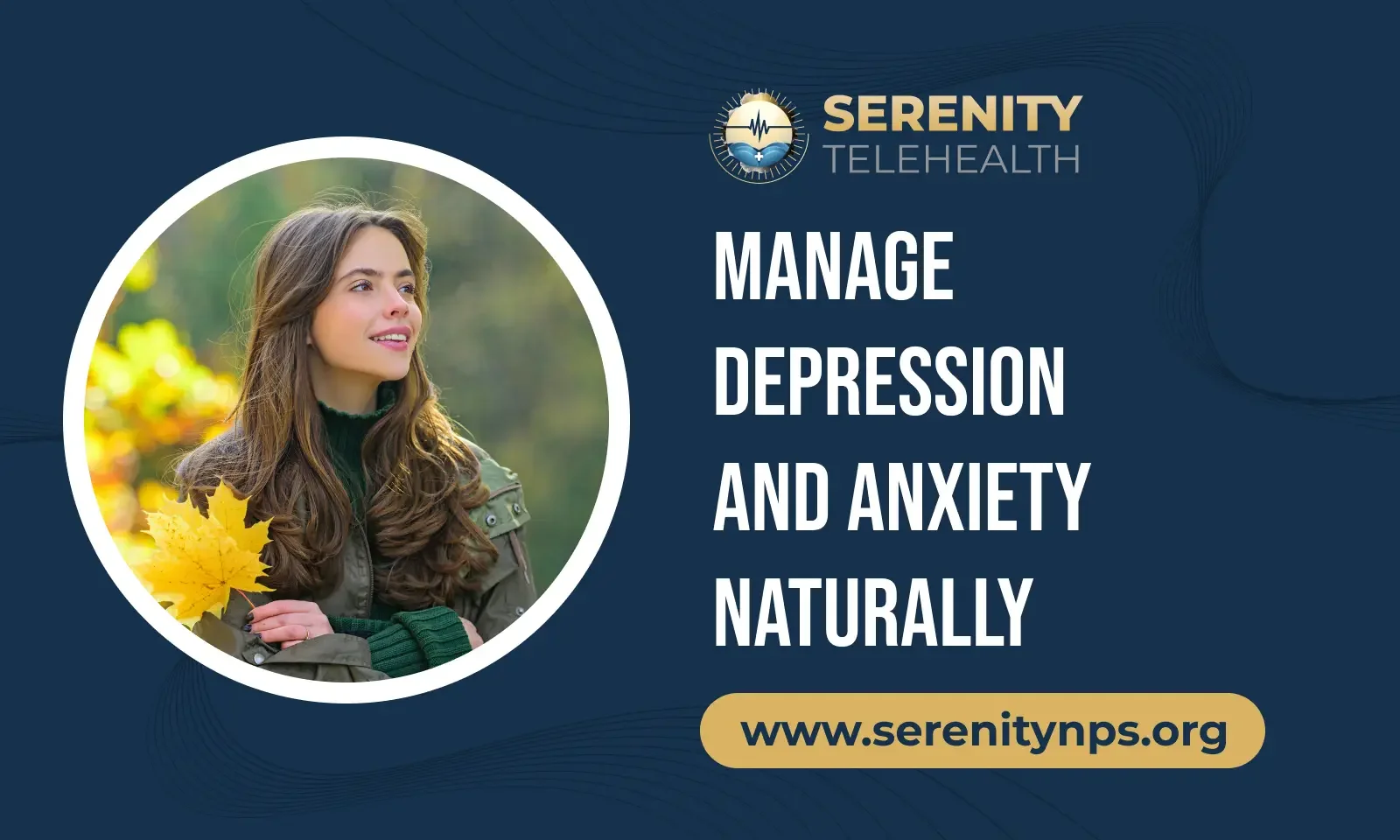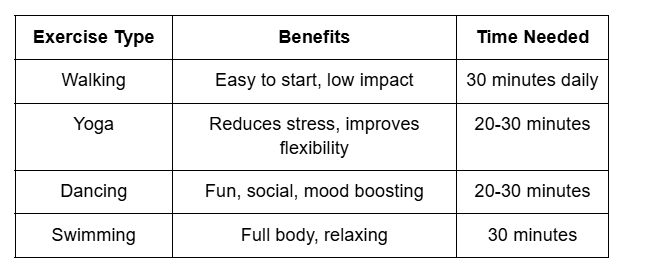Manage Depression and Anxiety Naturally
Did you know that 40 million adults in the US struggle with anxiety disorders? Depression affects 1 in 5 people at some point. Would you believe that 68% of people prefer natural remedies over medications? Studies show 73% of individuals want drug-free solutions for mental health concerns. Research indicates natural methods reduce anxiety symptoms by 45% on average. Simple lifestyle changes improve mood in 82% of people within weeks. Over 60% of adults report daily feelings of sadness or worry.
Do you feel sad, worried, or anxious most days without relief? Are you searching for natural solutions that don't involve prescription medications? Many people struggle with depression and anxiety, which affects their daily lives. Traditional medications work but often cause unwanted side effects like weight gain. Some individuals can't afford expensive therapy sessions or prescription drug costs. Others simply prefer natural, holistic approaches to managing their mental health.
Natural methods can significantly reduce depression and anxiety symptoms safely. Lifestyle changes like exercise, diet, and sleep improvements show proven results. Natural approaches work effectively alongside professional medical care when needed. Simple techniques reduce worry and sadness without harmful side effects. This comprehensive guide shows natural ways to manage depression and anxiety effectively. You'll learn safe, proven methods that anyone can start using today.
Understanding Depression and Anxiety
Depression and anxiety are common mental health conditions. They affect how you feel and think daily. Understanding these conditions helps you manage them better.
What is Depression
Depression makes you feel sad and hopeless often. You may lose interest in things you enjoyed. Energy levels drop, and everything feels hard. Sleep patterns change, and appetite may vary. Concentration becomes difficult at work or school. Physical symptoms like pain may occur too. Depression affects daily life and relationships badly.
What is Anxiety
Anxiety makes you feel worried and nervous constantly. Your heart may race, and your breathing becomes faster. Muscles feel tense, and the stomach may hurt. Sleep becomes difficult due to racing thoughts. You may avoid certain places or situations. Physical symptoms include sweating and shaking hands.
When to Seek Professional Help
Symptoms last more than two weeks continuously
Thoughts of self-harm or suicide occur
Unable to function at work or home
Lifestyle Changes for Mental Health
Simple lifestyle changes improve mental health significantly. These habits support overall well-being and mood. Making small changes leads to big improvements.
Regular Sleep Schedule
Go to bed at the same time every night. Wake up at the same time every morning. Aim for seven to nine hours of sleep. Keep the bedroom dark, quiet, and cool. Avoid screens one hour before bedtime. Create a relaxing bedtime routine to unwind. Poor sleep makes depression and anxiety worse.
Healthy Diet Habits
Eat regular meals throughout the day. Include fruits and vegetables in your diet. Choose whole grains over processed foods. Limit sugar and caffeine intake daily. Stay hydrated by drinking plenty of water. Avoid alcohol as it worsens mood. Good nutrition supports brain health and mood.
Limiting Screen Time
Too much screen time affects mental health. Social media can increase anxiety and sadness. Set time limits for phone and computer. Take regular breaks from screens throughout the day. Avoid screens before bedtime for better sleep. Spend time in real-world activities instead. Digital detox improves mood and reduces stress.
Exercise and Physical Activity
Exercise is one of the best natural remedies. Physical activity boosts mood and reduces anxiety. You do not need a gym membership. Simple activities work just as well.
Benefits of Regular Exercise
Exercise releases feel-good chemicals in the brain. Physical activity reduces stress hormones in the body. Regular movement improves sleep quality at night. Exercise boosts self-esteem and confidence levels. Physical activity provides a distraction from negative thoughts. Group exercise offers social connection and support.
Types of Exercise to Try
Creating an Exercise Routine
Start small with five to ten minutes daily. Gradually increase the time as fitness improves slowly. Schedule exercise at the same time each day. Find an exercise buddy for motivation and support. Mix different activities to prevent boredom completely. Celebrate small wins and progress made weekly.
Mindfulness and Meditation
Mindfulness helps you stay present in the moment. Meditation calms racing thoughts and worries. These practices reduce stress and improve mood.
Basic Meditation Techniques
Find a quiet, comfortable place to sit down. Close your eyes and focus on breathing slowly. Notice thoughts without judging them at all. Gently bring attention back to breath always. Start with five minutes and increase gradually. Use guided meditation apps for beginners to help. Practice the same time each day for consistency.
Breathing Exercises
Deep breathing activates the body's relaxation response immediately. Breathe in slowly through the nose for four counts. Hold breath for four counts at the top. Breathe out slowly through the mouth for four counts. Repeat this cycle five to ten times. The ice breathing exercises are used during stressful moments throughout the day. The breathing exercises work anywhere and anytime needed.
Mindfulness in Daily Life
Pay attention while eating meals slowly
Notice sensations during daily activities
Focus on one task at a time completely
Natural Supplements and Herbs
Some natural supplements may reduce the on and anxiety. Always talk to a doctor before taking supplements. Natural does not always mean safe for everyone. Quality and dosage matter for effectiveness and safety.
Common Supplements
Omega-3 fatty acids support brain health well. Vitamin D deficiency linked to depression symptoms. B vitamins help with energy and mood. Magnesium helps reduce anxiety and stress. Probiotics support gut health and the mood connection. Choose high-quality supplements from trusted brands.
Herbal Remedies
St. John's Wort may help mild depression. Chamomile tea reduces anxiety and promotes relaxation. Lavender aromatherapy calms the nervous system naturally. Ashwagandha helps the body manage stress better. Passionflower may reduce anxiety symptoms effectively. Herbs can interact with medications dangerously sometimes.
Safety Considerations
Some supplements interact badly with prescription medications. Pregnant women should avoid many herbal supplements. Quality varies greatly between supplement brands available. Start with low doses and monitor reactions. Stop taking it if you experience side effects. Buy from reputable sources with third-party testing. Natural remedies take time to show effects.
Tips to Reduce Anxiety and Depression
Simple daily tips help reduce anxiety and depression symptoms. These practical strategies work for most people easily. Small, consistent actions create big positive changes.
Daily Habits That Help
Start your morning with sunlight exposure outside. Drink plenty of water throughout the day. Limit caffeine and sugar intake for a stable mood. Take short breaks during work or study. Practice deep breathing when feeling stressed. End the day with gratitude journaling practice. Consistency with daily habits brings lasting results.
Quick Relief Techniques
Take a short walk when feeling overwhelmed. Call a friend or family member. Listen to calming music for relaxation. Do five minutes of stretching exercises. Use cold water on the face to reset. Count backwards from one hundred slowly. These techniques provide immediate relief from symptoms.
Long-Term Lifestyle Tips
Build a regular sleep schedule for better rest
Create a morning routine you enjoy daily
Limit news and social media consumption
Conclusion
Managing depression and anxiety naturally involves multiple approaches together. Lifestyle changes like sleep, diet, and exercise form the foundation. Mindfulness and meditation calm the mind and reduce worry. Social connections provide support and reduce feelings. Natural supplements may help, but need medical guidance. Stress management and creative activities improve overall well-being.
FAQs
How long before natural methods show results? Most people see improvements within a few weeks. Exercise benefits may appear within one to two weeks. Diet and sleep changes take two to four weeks. Consistency is key to seeing positive results.
Can exercise really help with depression? Yes, exercise is proven to improve mood significantly. Physical activity releases feel-good chemicals in the brain. Regular exercise reduces stress hormones in the body.
What if natural methods do not work? Seek professional help for additional treatment options. A therapist can provide specialized guidance and tools. Medication may be necessary for moderate to severe symptoms. Combining natural methods with professional care works best.
How much exercise is needed daily? Aim for at least thirty minutes most days. Start with five to ten minutes if needed. Gradually increase time as fitness improves over weeks. Any movement is better than no movement at all.
Are supplements necessary for everyone? No, focus on lifestyle changes first, always. Most people get nutrients from a healthy diet. Supplements help only if you have specific deficiencies. Talk to a doctor before starting any supplement regimen.


